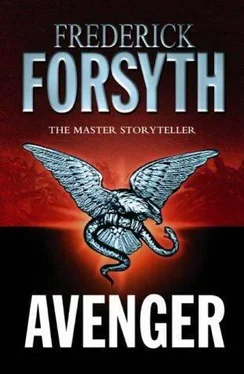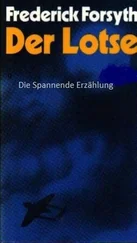"*Muchas gracias. Adios*," said McBride to his police driver. The man nodded, keen to get back to the capital.
Inside the giant timber gates, made of beams the size of rail sleepers and machine operated, was a table. McBride was expertly frisked for concealed weapons, then his suitcase was searched on the table. A whitestarched butler descended from an upper terrace and waited until the precautions were complete.
Kulac grunted that he was satisfied. With the butler in the lead, carrying the suitcase, the three went up the steps. McBride got his first real glimpse of the mansion.
It was three stories tall, set in manicured lawns. Two peons in white tunics could be seen at a distance, intent on their gardening. The house was not unlike some of the more luxurious residences seen along the French, Italian, and Croatian Rivieras, each upper room balconied but steel shuttered against the heat.
The flagged patio on which they stood may have been several feet above the base of the gate they had entered, but it was still below the top of the protective wall. One could see over the wall to the cordillera through which McBride had come, but no sniper in the near ground was going to be able to fire over the wall to hit someone on the terrace.
Set into the patio was a gleaming blue swimming pool, and beside the pool a large table of white Carrara marble on stone supports was set for lunch. Silver and crystal glittered.
To one side, a cluster of easy chairs surrounded a table on which an ice bucket played host to a bottle of Dom Perignon. The butler gestured that McBride should sit. The bodyguard remained upright and alert. From the deep shade of the villa a man emerged in white slacks and cream silk safari shirt.
McBride hardly recognised the man who had once been Zoran Zilic, gang enforcer from Zemun District, Belgrade; mobster of a dozen underworld rackets in Germany and Sweden; killer in the Bosnian war; runner of prostitutes, drugs, and arms out of Belgrade; embezzler of the Yugoslav treasury; and eventually fugitive from justice.
The new face bore little resemblance to the one in the CIA file. That spring the Swiss surgeons had done a good job. The Baltic pallor was replaced by a tropical tan, and only the fine white lines of scars refused to darken. But McBride had once been told that ears, like fingerprints, were totally distinctive to each human being and, short of surgery, never change. Zilic's ears were the same, and his fingerprints, and when they shook hands McBride noticed the hazel, wild animal eyes.
Zilic sat at the marble table and nodded to the only other vacant setting. McBride sat. There was a rapid exchange in Serbo-Croat between Zilic and the bodyguard. The muscular thug ambled away to eat somewhere else. A very young and pretty Martino girl in a blue maid's uniform filled two flutes of champagne. Zilic proposed no toast; he studied the amber liquid, then downed it without pause.
"This man," he said in good if not flawless English, "who is he?"
"We do not exactly know. He is a private contractor. Very secretive. Known only by his own chosen code name."
"And what is that?"
"The Avenger."
The Serb considered the word, then shrugged. Two more girls began to serve the meal. There were quail egg tartlets and asparagus in melted butter.
"All made on the estate?" asked McBride.
Zilic nodded.
"Bread, salads, eggs, milk, olive oil, grapesÉI saw them all as we drove through."
Another nod.
"Why does he come after me?" asked the Serb.
McBride thought. If he gave the real reason, the Serb might decide there was no point in further cooperation with the U. S. or any part of its establishment on the grounds that they would never forgive him anyway. His charge from Devereaux was to keep the loathsome creature inside the Peregrine team.
"We do not know," he said. "He was contracted by somebody else, perhaps an old enemy from Yugoslavia."
Zilic thought it through, then shook his head.
"Why did you leave it so late, Mr. McBride?"
"We knew nothing of this man until you complained of the plane flying over your estate and taking pictures. You took the registration number. Fine. Then you sent men to Guyana to intervene. Mr. Devereaux thought we could find the interloper, identify him, and stop him. He slipped through the net."
The lobsters were cold in mayonnaise, also from local ingredients. To round off there were Muscat grapes and peaches, with strong black coffee.
The butler offered Cohiba Cuban cigars and waited until both were drawing well before leaving. The Serb seemed lost in thought.
The three pretty waitresses were lined up against the wall of the house.
Zilic turned in his chair, pointed at one, and snapped his fingers. The girl went pale but turned and entered the house, presumably to prepare herself for her master's arrival. "I take a siesta at this hour. It is a local custom and quite a good one. Before I leave, let me tell you something. I designed this fortress with Major Van Rensberg, whom you will meet. I regard it as probably the safest place on earth.
"I do not believe your mercenary will even be able to get in here. If he does, he will never leave alive. The security systems here have been tested. This man may have gotten past you; he will not get past my systems and near to me. While I enjoy my rest, Van Rensberg will show you around. Then you can tell Mr. Devereaux his crisis is over. Until later."
He rose and left the table. McBride stayed on. Below the terrace the door in the main gate opened and a man walked up the steps to the flagstones. McBride knew him from the files, but pretended not to.
Adriaan Van Rensberg was another man with a history. During the period when the National Party and its apartheid policies ruled South Africa, he had been an eager recruit to the Bureau of State Security, the dreaded BOSS, and had risen through the ranks due to his dedication to the extreme forms of that body's excesses.
After the arrival of Nelson Mandela, he had joined the extreme-right AWB Party led by Eugene Terre Blanche, and when that collapsed he thought it would be wiser to flee the country. After several years hiring out his services as steward and security expert to a number of European fascist factions, he had caught the eye of Zoran Zilic and landed the plum job of devising, designing, building, and commanding the fortress hacienda of El Punto. Unlike Colonel Moreno, the South African's size was not due to fat but muscled bulk. Only the belly folding over the broad leather belt betrayed a taste for beer and plenty of it.
McBride noted that he had designed himself a uniform for the part, combat boots, jungle camouflage, leopard skin-ringed bush hat, and flattering insignia.
"Mr. McBride? The American gentleman?"
"That's me."
"Major Van Rensberg, head of security. I am instructed to give you a tour of the estate. Shall we say tomorrow morning? Eightthirty?"
In the car park at the resort of La Bahia, one of the policemen found the Ford. The plates were local but forged and made up in a garage elsewhere. The manual in the glove compartment was in Dutch. As in Suriname. Much later someone recalled seeing a backpacker with a large, camouflaged Bergen haversack trekking away from the resort on foot. He was heading east. Colonel Moreno called back his entire police force and the army to their barracks. In the morning, he said, they would climb and sweep the cordillera from the landward side, from the road to the crest.
It was the second sunset and fall of darkness that Dexter had witnessed from his invisible prone position on the peak of the sierra, and it would be his last.
Still motionless, he watched the last lights snuff in the windows of the peninsula below him, then he prepared to move. They rose early down there and slept little. For him as well there would be, again, precious little sleep.
Читать дальше










